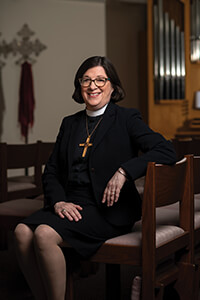All created things
March 29, 2019
God’s entire divine nature is wholly and entirely in all creatures, more deeply, more inwardly, more present than the creature is to itself (Martin Luther).
I am formed by the Lutheran movement, so I tend to look for law and gospel, judgment and promise in everything. This quote from Luther is no exception. It does speak a word of judgment and, at the same time, a word of promise that brings hope.
First the law. “God’s divine nature is … more present than the creature is to itself.” There is a tendency, especially in Western culture, for humans to see themselves as distinct from the creation. This positioning of human creatures as separate from the creation causes harm to the creation. We become the actors and creation is acted upon. The rest of creation becomes a commodity to be used as humankind sees fit. This has had dire consequences for our planet, the atmosphere around it and even space, which is now littered with our cast-off machinery.
But setting ourselves apart from the creation is also physically and spiritually deadly for humans. The burden of climate change falls disproportionately on people who are poor. Access to clean air and water and to sustainable living is often blocked in impoverished communities. Eventually income won’t guarantee anyone an escape. Hurricanes and wildfires visit destruction on rich and poor alike.
Physical alienation has spiritual consequences. If “God’s entire divine nature is wholly and entirely in all creatures, more deeply, more inwardly, more present than the creature is to itself,” then denying our creatureliness sets up an internal dislocation for the human and separates us from God. It isn’t possible to be whole apart from the rest of creation. We miss the divine all around us and deny the intimate presence of God within us. What a lonely way to live.
Somehow the church has been heard as setting spiritual against material, that the highest goal is to transcend creatureliness. This attitude discounts the witness of Genesis where “God saw everything that he had made, and indeed, it was very good” (Genesis 1:31). Even after the rebellion in the garden, God never stopped caring for creation.
And in the incarnation, God became a creature in Jesus Christ. Lutherans hold fast to the belief that “Jesus Christ, true God, begotten of the Father in eternity, and also a true human being, born of the virgin Mary, is [our] Lord” (Small Catechism; Apostle’s Creed, Article 2). The Reformers insisted the human nature of Christ is not an abstract concept. Jesus is true God and true human being. “Therefore, we believe, teach, and confess that God is a human being and a human being is God” (Epitome, Article VIII).
In communion, Lutherans also hold fast to the real presence of Christ. “We believe, teach, and confess that in the Holy Supper the body and blood of Christ are truly and essentially present, truly distributed and received with the bread and wine” (Epitome, Article VII).
Humans are Earth creatures, formed from the Earth (Genesis 2:7). God has entrusted us with the care of creation. Our social statement, “Caring for Creation: Vision, Hope and Justice,” reminds us that “we are to love the earth as God loves us.”
April 22 is Earth Day. Let us be especially mindful of the gift of creation and our place in it.
Here’s the gospel. Human beings are part of the creation. Human beings are connected to everything in the cosmos. Human beings are connected to God. We are not doomed to alienation. That God is more present than we are to ourselves gives us a path to reconnect with God, each other and all of creation. The judgment is that we do not even perceive that the One who created all things is intimately present. The promise is that the One who created all things is intimately present. We—all created things—are family.


